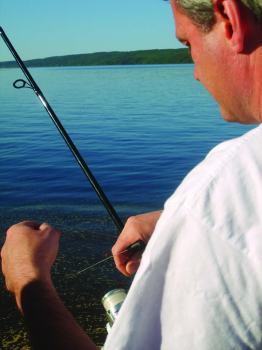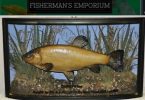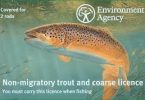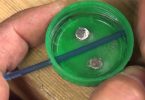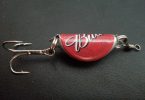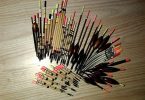My father taught me the joys of fishing the rapids and eddies of the rivers that flowed through my hometown. Growing up in northern Minnesota, we had the great joy of not only one but two rivers that met there – the Clearwater and the Red Lake River. I spent most of the summers of my youth fishing, canoeing and swimming on them with my brothers. No matter how far away I have ventured since then, those rivers still flow through me today.
Lake Fisherman
 This summer, I went on a guided fishing trip in Sweden on Lake Fryken. The trip was actually a present from our Swedish friends for my wife’s 40th birthday but in her heart she is not a fisherman. We set out on a warm July morning at 4:00 a.m. I have a hard time describing how beautiful the red-golden sun can make you feel reflecting off the misty still lake at such times. During the summers in Scandinavia, the sun rises so early and sets so late that you can have a hard time determining whether you are witnessing a beautiful sunrise or sunset.
This summer, I went on a guided fishing trip in Sweden on Lake Fryken. The trip was actually a present from our Swedish friends for my wife’s 40th birthday but in her heart she is not a fisherman. We set out on a warm July morning at 4:00 a.m. I have a hard time describing how beautiful the red-golden sun can make you feel reflecting off the misty still lake at such times. During the summers in Scandinavia, the sun rises so early and sets so late that you can have a hard time determining whether you are witnessing a beautiful sunrise or sunset.
Lake Fryken – a treasure residing just north of Karlstad in central Sweden – is an impressionist’s synopsis of the Swedish rural landscape. The sun rises over the lake in a sublime movement– slowly and peacefully – not wanting to interfere with anyone not willing to rise before the break of day. But it is also willing to give pleasure to anyone with the ability to rise early and simply enjoy its essence.
We put the boat in at about 4:30 a.m. – nothing fancy – just a well-rigged boat with 8 rods and an 85 horse motor on the back. Fortunately, we were guided by a young man who loved the experience of fishing Lake Fryken so much that even if alone, he would have been on the lake at the same time that morning. Over the next 8 hours we trolled along the deep finger lake at about 3 kilometres per hour, only fishing the part of the lake known as Lower Fryken.
The lake actually extends over a hundred kilometres northward in a deep valley that allows the water from the north of Varmlands province in Sweden to eventually reach the North Sea.
It was not until 8:00 a.m. that we saw our first strike, a good-sized walleye (in Swedish it is called a “gös” but it is still clearly the evolutionary equivalent of the largest fish in the Perch family). It measured 51 centimeters – 1 centimeter over the size limit for the lake.
We used out-riggers to push out the 8 lines to each side, each carrying a 6 inch perch-like lure. When a big fish hit, it was designed so that it pulled the line off the main rig and then let it run until someone woke-up, grabbed the rod and hooked the fish. I say “woke-up” only because you do nothing until a fish hits – absolutely nothing – other than watch the electronic depth and fish monitor, stare at the lake and wonder about the meaning of life.
Ocean Fisherman
On my 30th birthday, my brother Mike and I went fishing together with our wives in the patch of ocean known as Block Island Sound. We were fishing “blues” – a tremendously aggressive fish with sharp teeth that thrives in the autumn in the warm coastal waters.
Once again, I did not have a rod in my hand. Our guide used rods with no less than 3 hooks on them, something that would otherwise be illegal in Minnesota. My brother and I watched him rig the rods with a certain sense of intrinsic guilt. We were not playing fair.
As it turns out, when you are fishing blues they come in droves once you find them. That means that if you do in fact have three hooks on the line you will get three hits at the same time as the lures run through the school of fish.
As the paying customer (read that fisherman), you are then allowed to sit in the chair and real in the fish – a fine, strong fish with none of the play one would otherwise expect. Not to take anything away from the captain, who must have spent years learning the routines of these fine fish, I found it boring given my river upbringing.
I have also spent time jibbing (raising and lowering your arm holding a set line with a hooked lure) for cod off the Norwegian coast south of Narvik. Anyone who has done this can tell you that the only joy in such a trip either lies in the size of the fish you eventually pull over the side of the boat or the joy of the aquavit you might per chance be drinking.
River Fisherman
River fishing is entirely different. I need a fishing rod in my hands at all times or I don’t feel like I am really fishing – more like an impostor. You have to know how everything hangs together naturally and geologically to be successful. That means that when a river bends you have to know where it will be shallow and where it will be deep. You also need to know where the current will suddenly run fast or slow and where the water will inexplicably run deep.
My experience with rivers always starts with my father – who loved spending time with me and my brothers fishing. He grew up in northern Michigan on the Pine River and it taught him how rivers behave.
We were lucky enough to witness together the formation of an oxbow lake on the Red Lake River just outside my hometown, an event that happens once in several lifetimes.
River fishing is about knowing intimately your environment. You need to know every deep pool and every hidden estuary where fish tend to congregate for no apparent reason.
Cat-fishing for me best symbolizes the time I spent with my father and my brothers. We usually tried to set out at 6 p.m. to catch the lingering sunlight and a good bait fish we called “suckers” – bottom feeding fish resembling carp.
If we were successful (which we inevitably were), we would put sucker meat on treble hooks and wait for a catfish to bite through the evening. The key was to have an incredibly high raging fire along the river bank, coupled with aluminium gum wrappers twisted at the end of your rod so you knew when the action was on its way. When a catfish would hit the line, we could struggle for an hour or more to get it to the shore.
For me, ocean and lake-fishing always lack the intimacy of river fishing. Instead of long leads and constantly taught lines, a river fisherman works with the flow of the water on the day and their natural understanding of its course through the myriad of conditions – ebbing, flowing and eternally changing.
To me, river fishermen make ocean and lake fishermen seem akin to crude industrialists; armed with their technological devises, they seem to me closer to miners at a coal-face than a person enjoying the pursuit of the historical and primordial battle between a man and a fish.

Scott on Lake Fryken, as painted by his daughter, Hanna

